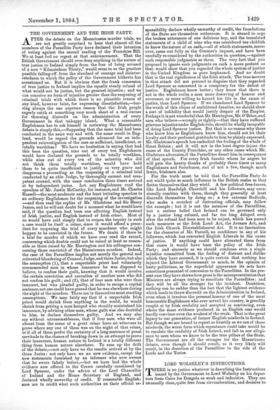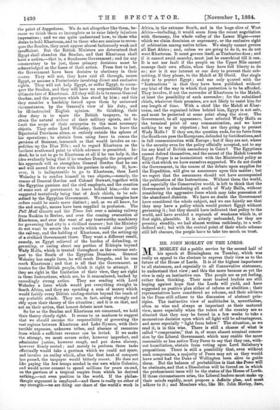LORD WOLSELEY'S INSTRUCTIONS.
THERE is no justice whatever in describing the Instructions issued by the Government to Lord Wolseley on his depar- ture from Cairo for Dongola as weak and indecisive. They are unusually clear, quite free from circumlocution, and decisive to the point of doggedness. We do not altogether like them, be- cause we think them so incomplete as to raise falsely injurious impressions ; and we can quite understand how, to those who desire to hold Khartoum, and to those who are anxious to recon- quer the Soudan, they must appear almost ludicrously weak and insufficient. But the British Ministers are determined that Egypt shall abandon the Soudan, and that Khartoum shall have a native,—that is, a Soudanese Government; and for any commentary to be just, those primary decisions must be acknowledged as the bases of their action. From first to last, the Government have been decisive to obstinacy in their course. They will not, they have said all through, annex Egypt, or assume a Protectorate involving direct and exclusive rights. They will not help Egypt, or suffer Egypt, to recon- quer the Soudan, and they will have no responsibility for the ultimate fate of Khartoum. All they will do is to rescue General Gordon, and the garrison which has stood by him ; and this they consider a hardship forced upon them by untoward circumstances, by the General's view of his duty, and by ill-instructed English opinion. So thinking, their clear duty is to spare the British taxpayer, to re- attain the natural ardour of their military agents, and to limit the scope of their enterprise to the most necessary objects. They order Lord Wolseley, therefore, to leave the Equatorial Provinces alone, as entirely outside the sphere of his' operations ; to abstain from using force to rescue the garrison of Sennaar, inasmuch as that would involve an ex- pedition up the Blue Nile ; and to regard Khartoum as the furthest southward point to which advance is permitted. In- deed; he is not to go to Khartoum at all if he can help it, the idea. evidently being that if he reaches Dongola the prospect of his approach will so strengthen General Gordon that he can and will ascend the river with his garrison in safety. If, how- ever, it is indispensable to go to Khartoum, then Lord Wolseley is to confine himself to two objects,—namely, the rescue' of General Gordon and Colonel Stewart, together with the Egyptian garrison and the civil employes, and the creation of some•eort of government to leave behind him,—the one suggested tentatively being that of Arab chiefs, to be sub- sidised by the Egyptian Government. We cannot imagine how orders could be made more distinct ; and, as we all know, for the end sought, means have been supplied in profusion. The Pall Mall Gazette and the Times fret over a missing railway from Suakim to Berber, and over the coming evacuation of Khartoum, and over the want of any trustworthy machinery for governing that city in a civilised manner ; but the Ministry do not want to secure the results which would alone justify the railway, and the holding of Khartoum, and the setting-up of &civilised Government there. They want a different result, namely, an Egypt relieved of the burden of defending, or governing, or caring about any portion of Ethiopia beyond Wady Haifa, which is treated throughout as the extreme out- post to the South of the Egyptian Dominion. General Wolseley has ample force, he will reach Dongola, and he can reach Khartoum ; and that is all that the Government, as trustee for the British people, think it right to attempt. If they are right in the limitation of their view, they are right in' these Instructions, which are, be it remembered, backed by exceedingly strong action. They are sending with Lord Wolseley a force which would put everything straight in South Africa, and they are spending a sum of money which would fortify every British coaling-station beyond the reach of any probable attack. They are, in fact, acting strongly and ably upon their theory of the situation ; and it is on that, and not' on their action, that honest debate must turn.
So. far as the Soudan and Khartoum are concerned, we hold their theory clearly right. It seems to us madness to suggest that we should assume the responsibility of governing the vast regions between Khartoum and Lake Nyanza, with their terrible• expanses, unknown tribes, and absence of resources from. which a sufficient revenue can be levied. If we make the attempt, we must secure order, however imperfect, and administer justice, however rough, and put down slavery, however firmly rooted ; and merely to perform those tasks effectually would take a garrison which we could not spare, and involve an outlay which, after the first heat of conquest has passed, the taxpayer would bitterly resent. He does not like paying the few troops needed in our own white Colonies, and would never consent to spend millions for years on-end, on the garrison of a tropical empire from which he derived nothing,—not even position in the world. If the philan- thropic argument is employed—and there is really• no, other of any strength—we are doing our share of the world:s‘ work in Africa, in the extreme South, and in the huge slice of_ West Africa—including, it would seem from the recent negotiation with Germany, the whole valley of the Lower Niger—over which we claim dominion or supremacy, or the exclusive right of arbitration among native tribes. We simply cannot govern all East Africa ; and, unless we are going to do it, we do not want Khartoum. It must govern itself, as Timbuctoo does ; and if it cannot avoid anarchy, must just be anarchical till it can. It is not our fault if the people on the Upper Nile cannot manage their own affairs, when they have full liberty to do so ; nor is it our interest or our duty to prevent their sub- mitting, if they please, to the Mandi at El Obeid. Our single duty is to protect Egypt ; and our only quarrel with the " Instructions " is that they have been published without any hint of the way in which that protection is to be afforded. They involve, if not the surrender of Khartoum to the Mandi, at least the possibility of such surrender; for the subsidised chiefs, whatever their promises, are not likely to resist him for any length of time. With a chief like the Mandi at Khar- toum, and the organised tribes behind him, Egypt is not safe, and must be protected at some point along the river. The Government, to all appearance, have selected Wady Haifa as the terminal point of easy communication, and we have nothing to say in objection ; but are they going to protest Wady Haifa If they are, the question ends, for no force from the South can pass the Europeans, defended by fortifications, and in full communication with Europe; but if they are not, where is the security even for the policy officially accepted, not to say for any kind of British ascendancy in Cairo The Egyptians cannot defend themselves, and the ascent of the Mandi towards Egypt Proper is as inconsistent with the Ministerial policy as with that which we have ourselves supported. We do not doubt the Government, in the course of the debate upon supplies for the Expedition, will give us assurances upon this matter ; but we regret that the assurances should not have accompanied the publication of the Instructions. Without them the world, and especially the Conservative world, is left to think that the Government is abandoning all south of Wady Haifa, without considering the aggressive force which may take possession of the abandoned districts. We have no doubt the Government have• considered the whole subject, and we can faintly see that they may have a policy which would protect Egypt without governing it ; but they should have indicated that policy to the world, and have avoided a reproach of weakness which is, at first sight, plausible. It is utterly unfounded, for they are pressing steadily, we had almost written ruthlessly, to a well- defined end ; but with the central point of their whole scheme still left obscure, the people have to take too much on trust.















































 Previous page
Previous page